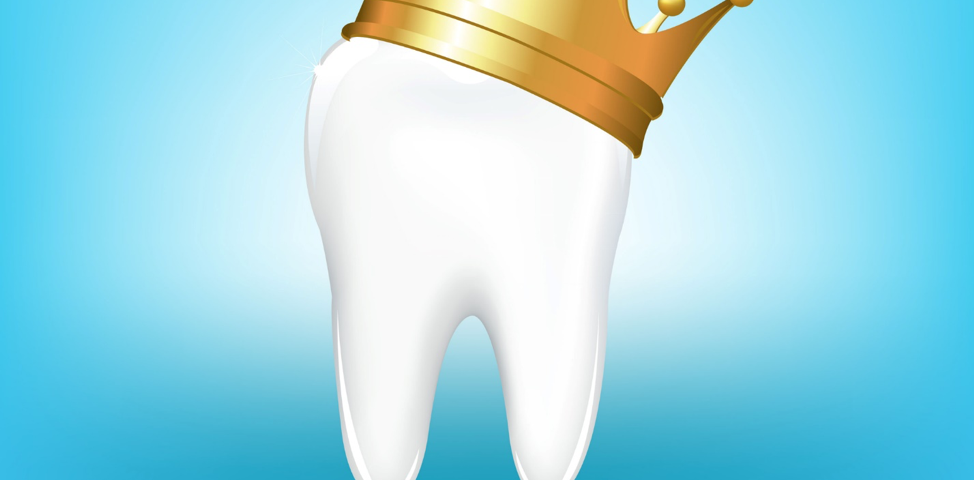
Do you need new dentures?
February 21, 2020
Dental Implants for Single Tooth Replacement
March 6, 2020A dental crown covers or replaces the visible part of a damaged or missing tooth. Your dentist can create a custom dental crown that restores your tooth to its natural size, shape, and strength. This improves your mouth’s function and appearance.
Patients need a dental crown to correct a variety of issues, including:
- A weak or worn-down tooth
- A cracked tooth
- A broken tooth
- Large fillings
- Severely discolored or misshapen teeth
Dental crowns also support dental bridges and cover dental implants. If you’re unsure whether you need a dental crown, be sure to schedule an appointment with your dentist.
Most of these dental issues are caused by poor oral hygiene, an unhealthy diet, and trauma. To prevent these dental problems and reduce your need for a dental crown, follow these oral hygiene tips:
Brush properly.
Most people brush their teeth in the morning and evening but aren’t aware of the proper brushing technique. According to the American Dental Association, here’s how to get the most out of brushing:
- Brush for two minutes, two times a day.
- Place your toothbrush at a 45-degree angle.
- Gently brush back and forth.
- Brush the inner, outer, and chewing surface of each tooth.
- Brush or scrape your tongue.
Floss daily.
We suggest flossing after you’ve eaten your last meal for the day. Flossing is the best way to ensure no food particles or disease-causing bacteria linger between your teeth.
Whether you use regular dental floss or dental floss picks, your teeth will feel cleaner, look prettier, and be healthier! Make sure to get between every single tooth and to move the floss away from the gums. Check out this PDF from the ADA for further instructions.
Eat properly.
What you put in your mouth matters. Food doesn’t simply move from your mouth to your stomach; it affects the balance of good and bad bacteria in your mouth. People who eat too much sugar are much more susceptible to tooth decay. Acidic foods and beverages also wear down your dental enamel.
Here are the types of food that strengthen your teeth:
- Protein-rich foods like meat, eggs, tofu, beans, nuts, and leafy vegetables
- Calcium-rich foods such as milk, cheese, and yogurt
- Vitamin C-rich foods like strawberries, oranges, apples, and kiwis
- Vitamin D-rich foods like fish and mushrooms
- Magnesium-rich foods such as rice, corn, barley, wheat, and oats
Water is also one of the most important parts of a teeth-healthy diet! Limiting your consumption of sugary soft drinks and coffees will dramatically improve your oral health and strengthen your teeth.
Wear a mouthguard.
Dental crowns are often used to treat patients with dental trauma due to sports injuries. If you’re involved in any contact sports, a mouthguard is extremely beneficial. Dental injuries that occur during collision sports include:
- Chipped teeth
- Broken teeth
- Lip and cheek injuries
- Root damage
- Fractured jaws
- Concussions
Mouthguards provide significant protection against sports-related trauma. They also protect against teeth grinding. If you wake up with jaw pain, facial pain, or a dull headache, bruxism may be the issue. This can wear down your teeth and even cause them to crack or break. Talk to your dentist about a custom mouthguard to protect your teeth and jaw from injury.
Attend regular dental cleanings.
Dentists and the ADA recommend attending a regular dental cleaning and exam appointment every six months. These appointments ensure your smile is as healthy can be! Your dentist will take necessary preventive measures to reduce your risk of ever needing a dental crown.
We want your natural teeth to last as long as possible! And they can when you follow these oral hygiene tips.
If you find yourself needing a dental crown, don’t worry! Our dentist will help you establish a good oral hygiene routine and healthy habits to ensure the rest of your teeth aren’t at risk.
To meet with our friendly dental team, contact our Grant Park office today at 404-328-7177.


